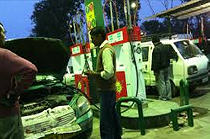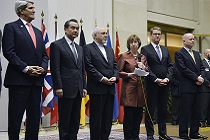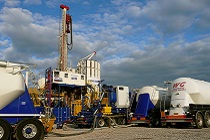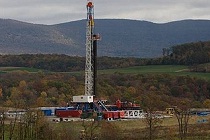Making the shift to natural gas
In his budget speech, the Indian finance minister hinted at a greater role for natural gas in India’s energy mix. The shift will help diversify our energy sources, reduce our import bills and cut pollution.
 Courtesy: Wikipedia
Courtesy: Wikipedia
In his budget speech, the Indian finance minister hinted at a greater role for natural gas in India’s energy mix. The shift will help diversify our energy sources, reduce our import bills and cut pollution.
 Courtesy: Indian Embassy Thimphu
Courtesy: Indian Embassy Thimphu
India’s long-term positive relationship with Bhutan is underpinned by hydropower: India helped develop Bhutan’s power projects and we purchase the surplus energy.The India-Bhutan relationship can be a model for improving links with Nepal which is trying to develop at least three projects jointly with India
 Courtesy:
Courtesy:
The National Ignition Facility, U.S., has achieved a major breakthrough in generating fusion nuclear energy. India’s scientists, starting from Homi Bhabha, have been part of the process of realising this dream. Fusion energy can become a cheap, clean and abundant source for global energy needs
 Courtesy: European External Action Service
Courtesy: European External Action Service
On November 24, the P5+1 and Iran reached a consensus on the interim agreement regarding Tehran’s long-disputed nuclear program. How comprehensive is this agreement, and what are its potential upshots for U.S., and West Asia – especially Israel and Saudi Arabia? More importantly, can India play a positive role?
 Courtesy: Justin Woolford/Flickr
Courtesy: Justin Woolford/Flickr
India’s ability to meet its growing gas demand from shale depends on the availability of land and water, and minimising social and environmental costs. The government’s 2012 draft shale gas policy does not offer solutions. How can India create a stable investment environment for the shale gas market?
 Courtesy: Rita Willaert/Flickr
Courtesy: Rita Willaert/Flickr
While the rejection by Odisha’s Gram Sabhas of mining projects in the state indicates the triumph of direct democracy, concerns that international investors will shun India due to the fear of unfavourable conditions are rife. How can we work towards both greater democracy and mining projects necessary for growth?
 Courtesy: Penn State Outreach/Flickr
Courtesy: Penn State Outreach/Flickr
The significant shale gas deposits held by several countries, including India, have implications for global energy prices, geopolitics and climate change. But India needs to develop a strong shale gas policy that can help in lowering its trade deficit while ensuring sustainable development.
 Courtesy: quinn.anya/Flickr
Courtesy: quinn.anya/Flickr
The ongoing environmental movement in China - like many of the country’s burgeoning social movements - and those involved in it, are using various strategies to demand one of democracy’s preconditions—the rule of law.
 Courtesy: IAEA Imagebank/Flickr
Courtesy: IAEA Imagebank/Flickr
Ahead of nuclear talks between Iran and the P5+1 in Moscow, the West seems confident that sanctions will induce Iran to settle on its uranium enrichment. But rather than arriving at a negotiated settlement by applying the principle of reciprocity, the West may look to anaesthetize oil markets.
 Courtesy: Michael Trolove/WikimediaCommons
Courtesy: Michael Trolove/WikimediaCommons
Growing instability in the region make the planned Turkmenistan-Afghanistan-Pakistan-India (TAPI) gas pipeline seem more like a burden than a solution to India’s hunt for alternative energy sources. Is it wise for India to move ahead with the $7.6 billion project?